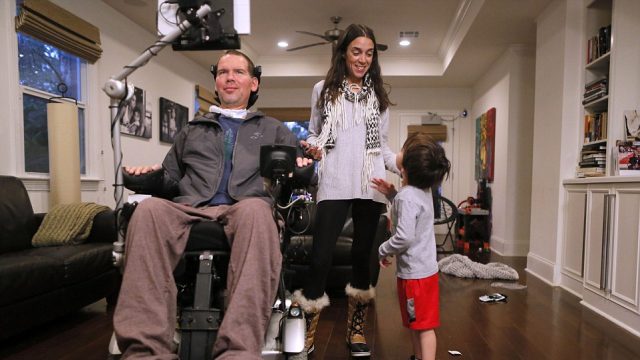
 Gleason
is a documentary film around the trials and tribulations of Steve
Gleason, a former NFL player who retired from the game in 2008, then was
diagnosed with ALS (Amyotrophic Lateral Sclerosis, aka Lou Gehrig's
disease) in 2011, concurrent to learning of the pregnancy of his wife
Michel with their first child. It's a disease that has no cure,
and those who are afflicted by it usually die within 2-5 years after
diagnosis. The sufferer's motor skills begin to erode, eventually
losing them altogether, including the ability to speak without
technological assistance.
Gleason
is a documentary film around the trials and tribulations of Steve
Gleason, a former NFL player who retired from the game in 2008, then was
diagnosed with ALS (Amyotrophic Lateral Sclerosis, aka Lou Gehrig's
disease) in 2011, concurrent to learning of the pregnancy of his wife
Michel with their first child. It's a disease that has no cure,
and those who are afflicted by it usually die within 2-5 years after
diagnosis. The sufferer's motor skills begin to erode, eventually
losing them altogether, including the ability to speak without
technological assistance.
Knowing that the odds for survival were bleak, and recovery completely
unheard of, Gleason sets about recording his life with the assistance of
a couple of associates, and begins to make video logs, while he still
has a voice, imparting his philosophies on life, love, and fatherhood
for his young son to watch at a day when he can understand, appreciate
and take them to heart most. It's something he didn't receive as
much as he would like from his own father, who worried about himself
much more and expected his sons to think and act just like him, and
Steve both wants (and, to some extent, internally fears) that his son
will have his own mind about things.
Director Clay Tweel, who sifted through about 1300 hours of footage to
winnow down into a sub 2-hour movie, finds the narrative thread of
fathers and sons to build upon for the thrust of this potent and
heartbreaking documentary experience that will likely leave no faces dry
by the end. Steve, in a desperate state to get better, consents to
go to a faith healer for his religious father, who seems to suggest that
his son's lack of faith may be the root cause of the ailment to begin
with. Watching Steve try to run with reduced motor skills, then
stumble, is heartbreaking. That heartbreak is further compounded
by the scene later of Steve's toddler son, Rivers, also running and
stumbling, causing us to muse on the fact that as Rivers gets stronger
and more confident with his body, Steve's is eroding.
Although the effects of ALS on Gleason is the main reason for making the
film, Tweel concentrates more on drawing out who Gleason is independent
of the disease -- his character, his resolve, his emotional connections
with family and friends, and even some of his flaws. One of the
things he and his wife Michel channel their energy into while they can
is a charity organization in order to help others afflicted with ALS get
the assistance they so desperately need, especially when Medicare and
Medicaid won't cover the costs of the vast expenses required for speech
technology assistance.
The other thing that Gleason showcases that we often don't get
to see is that debilitating diseases like ALS take their toll on more
than the one person who has it. We watch wife Michel go from a
relatively happy and energetic woman to one that looks like she can
barely muster the energy to get up in the morning, having to spend all
her days and nights caring for a young person in Rivers, while her
husband contributes to his care less and less, ultimately becoming even
needier than his toddler son in gaining her time and attention for his
basic necessities.
It's perhaps a bit disjointed in its patchwork way of putting all of the
pieces together, story wise, while you may see better documentaries from
a technical standpoint, you likely won't many more moving emotionally than
Gleason. While other films have tackled similar subject
matter of a parent with a terminal disease leaving recordings for a
child to come in a narrative form in such films as My Life an
My Life Without Me, nothing comes close to the devastation in
seeing such things devolve to utter heartbreak first hand.
Qwipster's rating: 






©2016
Vince Leo

 Gleason
is a documentary film around the trials and tribulations of Steve
Gleason, a former NFL player who retired from the game in 2008, then was
diagnosed with ALS (Amyotrophic Lateral Sclerosis, aka Lou Gehrig's
disease) in 2011, concurrent to learning of the pregnancy of his wife
Michel with their first child. It's a disease that has no cure,
and those who are afflicted by it usually die within 2-5 years after
diagnosis. The sufferer's motor skills begin to erode, eventually
losing them altogether, including the ability to speak without
technological assistance.
Gleason
is a documentary film around the trials and tribulations of Steve
Gleason, a former NFL player who retired from the game in 2008, then was
diagnosed with ALS (Amyotrophic Lateral Sclerosis, aka Lou Gehrig's
disease) in 2011, concurrent to learning of the pregnancy of his wife
Michel with their first child. It's a disease that has no cure,
and those who are afflicted by it usually die within 2-5 years after
diagnosis. The sufferer's motor skills begin to erode, eventually
losing them altogether, including the ability to speak without
technological assistance.